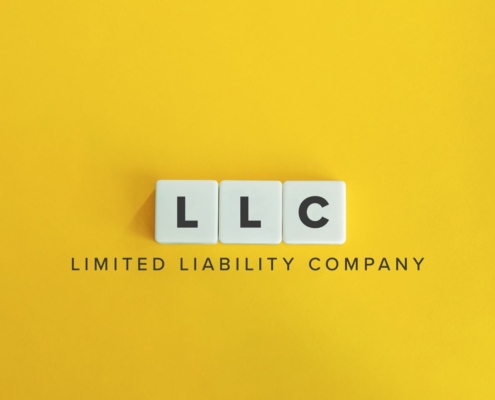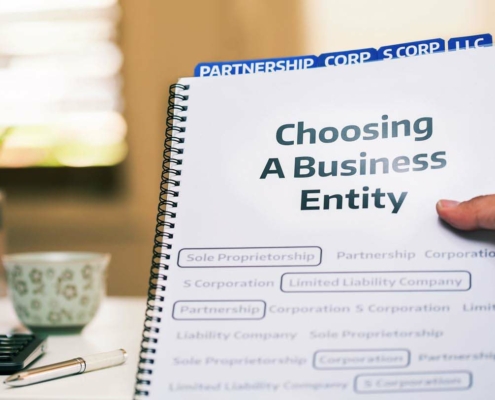When starting a business, or creating a corporation, it is common for business owners to have a lot of questions. One of the common questions is how the word “corporation” differs from “incorporation.” A corporation is the business itself, or the company. Incorporation, on the other hand, is the process of starting a corporation.
This means that a corporation, a limited partnership, and a non-profit corporation are incorporated entities – because they have gone through the process of incorporation to become corporations. They have filed a corporate charter, or founding document, with the state in which they operate. They also have a statute that determines the ownership and management structure. Corporations also have to file annual reports with the relevant state of operation.
Limited Liability Companies (LLCs), by contrast, are not incorporated. This means that they have not gone through the process of incorporation to become a corporation. Instead of a corporate charter, LLCs have an Operating Agreement to govern them. LLCs have more freedom in choosing a management structure, as well as more freedom to decide how the company will be taxed.
10. What Is Incorporation?
Incorporation is the legal process a company goes through to become a corporate entity. There are several reasons why a business might want to incorporate. For instance, corporations can protect the personal liability of owners. This is because a corporation’s liability is separate from that of the owner. This means that if the corporation faces a lawsuit, then the owner’s personal assets (car, home, savings, etc.) are safe from judgement.
When a business is incorporated, this means that it has filed the required paperwork with its state to become a corporation.
9. What Is the Difference Between Inc. and Corp.?
Inc. and Corp. are abbreviations that mean the same thing. Inc. means incorporated, while Corp. means corporation. When a corporation chooses its name, it can decide between adding either one of these suffixes to its name. There is no difference in meaning; both are being labeled as corporations. It is simply a personal stylistic choice.
8. How Is an LLC Formed?
The process of forming an LLC is relatively simple, and the first step is to come up with a name ending in LLC. LLC is the abbreviation for Limited Liability Company. Once an owner has a name in mind, he or she can contact a registered agent. He or she will then fill out paperwork for the agent. The agent will then file that paperwork with the state in order to form the company. The agent will be sure to send the state’s correspondence to the owner, for a fee, of course. When the state approves of the LLC formation, the agent will forward the company’s Certificate of Formation to the owner.
7. Is It Necessary to Incorporate Twice?
Incorporation is a one-time action. A corporation only needs to incorporate once. In order to do business in other states, it is only necessary to go on-record. Often, a corporation will be formed in one state and then do business mainly in another. If a corporation is formed in California, it can still do business in Texas or Virginia, for example. It may be required to go on-record with the state, but there is no effect on its ability to do business.
A corporation should determine, however, whether it will need a Certificate of Authority in the state in which the main business is conducted. This process is known as qualification. Its purpose is to register foreign companies with the state. “Foreign,” in this case, does not mean international, but out-of-state. This process should be done in any state in which the company operates outside of its state of incorporation.
6. Can a Company Incorporate in More Than One State?
A company may only incorporate once, in a single state. The process of foreign qualification, as discussed above, does not mean incorporating in each state in which the company does business. That is simply a registration process. It is possible for a corporation to form multiple entities if it has subsidiaries, but multiple entities are not needed for a single corporation. In fact, to incorporate more than once creates legal issues: which entity holds the company assets, for example.
A business owner has the freedom to choose a state whose laws suit the company.
5. How Many People Are Needed to Incorporate?
At least one person is required to incorporate a company. The person who owns the company is called the Legal Party. In a corporation, this same person is referred to as a shareholder or stockholder. In an LLC, this individual is called a member. The person who starts a company, known at the Legal Party, can function as sole director, officer, or shareholder of a corporation. They can also be the sole member of an LLC. An LLC that only has one member is called a single-member LLC. For tax purposes, it is known as a Disregarded Entity, or a “DRE.”
Essentially, in order to start a company, only one person is needed.
4. What Is the Cost of Incorporating?
The cost of incorporating will depend on the state in which an owner incorporates his or her business. Each state will have its own fee structure, and the fee will vary based on whether the company in question is an LLC or a corporation. The fee will also depend on how quickly one wants to incorporate.
3. What Is the Principal Place of Business?
The state where a business incorporates is called the “domestic” state, while the other states in which it does business are referred to as “foreign” states. An owner should be sure not to incorporate in other states beyond the domestic state. This would lead to having multiple companies under the same name, creating legal hurdles for an owner down the road. Instead of doing this, an owner should go “on-record” with a “foreign” state in which it is doing business. For example, let’s say a company incorporates in California. In that case, California is the domestic state. Now let’s say that company wants to do business in North Carolina. North Carolina would in that case be the “foreign” state in which the company conducts business.
When it comes to determining the principal place of business, it can get a little tricky. Sometimes, businesses have multiple locations. In order to figure out where the company conducts its principal business, one has to figure out where the executives make big decisions. One also has to know where the business activities are conducted. By balancing these two approaches, one is conducting a “total activities test.” Every company will have one principal place of business, and it is there that they must go on-record. Why? In the event that there is a problem and an aggrieved party needs to contact the company, there will be an address to serve the company with official papers.
2. Why Is This Required Legally?
Going on record is really just a matter of public record. The importance is that the company has an official, physical presence established. The public will be able to find the business. A company is subject to “general jurisdiction” in both the state of incorporation and the principal place of business. This means that the courts of both these states have jurisdiction over one’s business, no matter where a legal issue occurs.
However, in some states, a business is only subject to “specific jurisdiction.” This refers only to the activities that take place in the relevant state.
In states with general jurisdiction, a business must let the public know how to get in touch with them by providing a physical presence. The physical address could be the headquarters office or the registered agent’s office. By filing this information, people can look up the company with the secretary of state or find an address where they can serve legal papers.
1. Is It Necessary to Register in the Place of Principal Business?
Typically, states define conducting business as having a physical location in a state. This would include employees, shipping products, inventory, or holding licensing specific to that state. On occasion, a bank may request that a company be registered in order to open a bank account in the state of principal business. If a business may be classified as “micro,” meaning it only consists of one businessman, then getting registered may not be necessary.
In the end, each state has different requirements as to whether registration is necessary. It will depend often on the company’s level of activity in that state. Normally, a business will not need to worry about registering if it is only selling products, advertising, or selling services in that state. Provided, of course, that there are no offices or employees in that state.









![Letter of recommendation template sample [Ready to use]](https://nakaselawfirm.com/wp-content/uploads/Letter-of-recommendation-template-sample-Ready-to-use-495x400.jpg)











